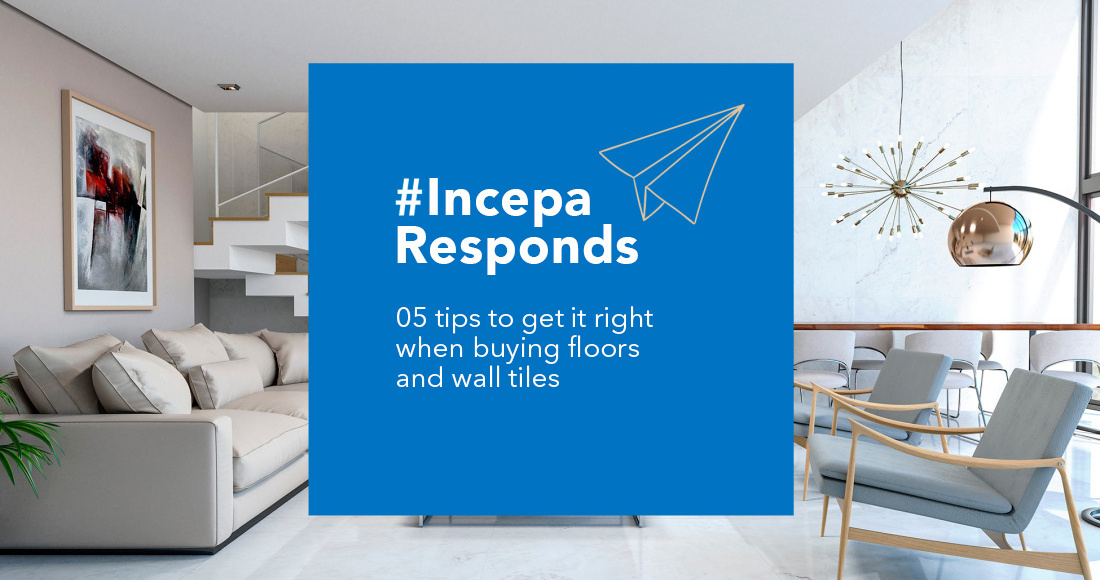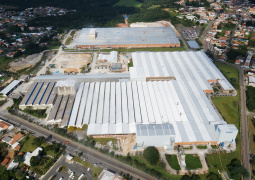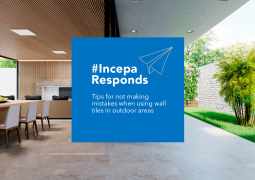Incepa Responds: 05 tips to get it right when buying floors and wall tiles

Choosing the wall tiles for the work is usually a long-awaited moment. After all, they will help give a special face to the rooms. In addition, they can be found in different materials, colors, sizes, patterns, and textures.
For this reason, when choosing, there are many doubts about which product is ideal. To help you in this mission, in this Incepa Responds we will present 05 unmissable tips that make your life easier when buying wall tiles for the property, whether residential, commercial, or corporate. Check it out!
01. Plan
Before hiring labor and buying the floors and wall tiles for the project, it is important to plan. Some points you should pay attention to:
- Supplier: After choosing the supplier, check if he has the necessary amount of materials for the footage of your work.
- Deadline: This item will vary depending on the availability of materials. If they are not ready for delivery, for example, you will have to wait until they arrive, postponing the work schedule.
- Budget: It is necessary to have a small allowance in the budget for the loss of materials. It is important to buy between 10% and 15% more parts for possible maintenance or in case of loss due to wrong cutting. This extra amount is very important, as the production of the chosen product may be discontinued in the future, or in other batches it may come with a different shade.
02. Labor
The second step to ensure the success of your project is to hire a good workforce to perform the service. We recommend those who already have experience in ceramic products, as the chances of having the right tools are greater.
This point deserves a lot of attention. After all, it’s no use buying the best products if they are installed by a professional who doesn’t know the correct procedure. As a result, we will have a poorly made and aesthetically unpleasant finish.
03. Understand the difference between bold and rectified edges
In addition to the visual part, it is also important to know some technical specifications when buying floors and wall tiles. In this scenario, you should know whether the wall tile has a bold edge or a rectified edge. Below, check out the main features of these products.
Bold edges
Pieces with bold are the most traditional and, for a long time, were the only option for a ceramic finish. They have rounded edges, which results in parts with uneven sides and surfaces and with small differences in size when compared to products with a ground finish.
This particularity makes the pieces have a greater spacing between them, with joints of at least 03mm, demanding a greater amount of grout for application. On the other hand, it is a more affordable and easy-to-install product.
Rectified edges
Unlike bold, rectified parts have straight edges, with narrower joints. This is because, when cutting the material, they use diamond discs that provide a high level of accuracy.
To install them, you don’t need as much grout as on the bold edge, resulting in thinner joints. In addition, because they have a regular finish, they cause a visual amplitude effect and add sophistication and elegance to the environment.
Despite the high price compared to bold wall tiles, the cost-benefit and aesthetic result make it well worth it.
We have exclusive content on this topic, where we explain the differences between the Bold and Rectified finish. Check it out!
04. Identify the texture of porcelain tiles
Following the technical care, but which also influence the final look of the work, it is important to pay attention to the texture of the pieces. The most common types of porcelain tile finishes are:
Polished
They have a smooth surface and intense shine, bringing refinement to the environment. However, it is not recommended to use it in wet areas, because, as it has a smooth surface and does not absorb water, it becomes slippery.
In addition, its shiny surface makes it more susceptible to scratches, so it needs a more careful cleaning, using only a damp cloth and neutral products.

Satin
The surface does not receive a layer of enamel, resulting in pieces with little or no shine. In addition, it has a silky and smooth texture, providing a feeling of coziness.
Because it doesn’t have enamel, it’s a little slippery and has less chance of scratching. This allows it to be used in different areas, both indoors and outdoors.

Natural
Porcelain tiles with a natural finish have a matt surface and a coefficient of friction between 0.40 and 0.49, which makes them ideal for use in uncovered, external environments that have contact with water, such as the area around the pool.

Enameled
Enameled porcelain is one that receives a layer of enamel from the surface to protect the printed pattern. In addition, Incepa enamels receive the exclusive ABS technology, which provides greater slip resistance and 30% more grip. To learn about other features of these finishes, click here.

05. Discover the color variations
Porcelain tiles are classified according to shade variation. Thus, they assume the following definitions:
- V1: show little variation, a very small and subtle difference between the pieces.
- V2: the pieces may have a slight shade variation.
- V3: fur with a moderate variation of shade, which have different prints in the same box. However, the nuances are similar, leaving the environment with a natural look.
- V4: is the maximum level of variation that the pieces can have. Random, boards can be completely different from each other.
We guarantee that, by following our step-by-step guide, the chances of your project failure are practically nil. Make the planning calmly, hire specialized labor and choose the wall tile with the appropriate technical characteristics. How about checking out our products? Click here and discover several options!



